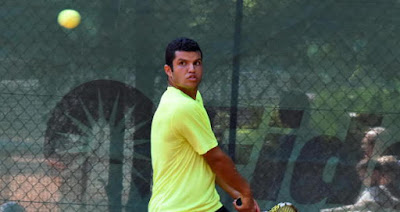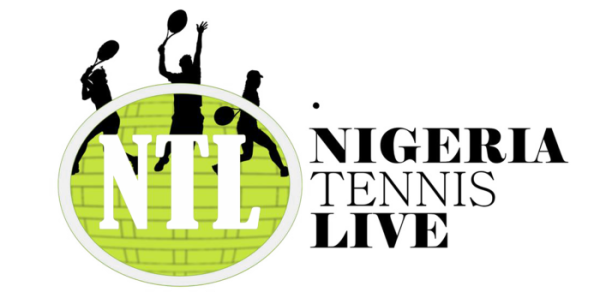Echoes of the 2017 Governor’s Cup Lagos Tennis Championship remain indelible in the hearts of those who played significant roles in the ITF Futures; from the administrators to the officials to the umpires and the actors themselves – the players.
The consistent ‘inconsistency’ of the Nigerian players over the past few years has made tennis lovers, enthusiasts and observers in the country lose hope in the possibility of anyone of them getting far in the $25,000 pro-circuit which serves West and Central Africa.
Even the players themselves often never see themselves winning the tournament as they (more often than not) set quarter final targets and even fall short in the first round in a manner that is fast becoming a trend during such championships.
While many are quick to lash out at the players for ineffective and lame serves, absence of top spins, accurate drop shots, faulty returns, they are also quick to forget how much these players struggle to get to the levels that they attained with little or no help from these same people who keep playing the blame game.
| Sylvester Emmanuel is presently on sponsorship to train and play in Barcelona, Spain. |
The organisers of the Governor’s Cup and the three other ITF Futures (Tombim, Dayak and GSL) in Nigeria have always stated clearly, how much they want the local players to seize the opportunity of such world class tournaments in their country to rake in ATP points without leaving the four walls of the country.
This has been next to impossible however, as the past few years have shown the farthest a Nigerian has gone at the ITF circuit is the quarter final, but is this the best Nigerian players can be?
For starters, all of the top tennis players in the world do not rake in points by playing five weeks of ITF Futures out of the 52 weeks in every year, at least, none of the players that came to Nigeria as top seeds achieved this feat by playing for only five weeks.
Interestingly, not many of these players on the circuit travel so far to play in these ITF Futures either, they play majority of the tournaments in their home country. The progress of the likes of Mohammed Karim-Mamoun from Egypt and Ilkel Cecil from Turkey proves this beyond reasonable doubts; they both raked in valuable points while playing ‘international tournaments’ in their respective countries.
These players come into ITF Futures from other tournaments and leave Nigeria for another week of intense pro-circuit engagement, a scenario which continues playing for the entire 52 weeks in a calendar year.
So, why is Nigeria’s case different from what is expected to be the norm in all countries where tennis is a cherished sport?
The players, even when they have so much to offer, lose belief in themselves when they consider their opponents’ profile and level of development. They therefore, do not get ashamed of losing the ITF Futures to the ‘foreigners’ every year since according to a school of thought: “it’s the white people’s birthright.”
 |
| Egypt’s Mamoun made it to the top 200 having played a lot of ITF Futures in his country. |
Even some of the coaches and top administrators believe it will only take a miracle for a Nigerian to win an ITF Futures, and rightly so, since they have not been on the same competitive level as their foreign counterparts.
But for how long will Nigeria keep acting like a butcher’s son eating bones? For how long will these tournaments continue to run for the foreigners to come and win? For how long will the NTF be seen as the pathway to the players’ success? For how long will Nigerian players feel unashamed to lose to even opponents of lower standards?
The organisers of the 2017 ITF Futures 1-5 may have concluded plans for the immediate past editions and also commenced talks about the next edition, but are the players also going to repeat the same mistakes of the previous years in 2018?
Are Nigerian players already thinking ahead and looking at a way of wrestling the ITF Futures from their more accomplished foreign counterparts? How many players even try to make inquiries about pro-circuits in Togo, Senegal, Zimbabwe, Egypt, Benin and other African countries?
How many of these players can afford to compete in these tournaments and have the assurance of further sponsorship whether they win or lose? How many of them even have personal coaches to put them through when they are not going the right way?
| Imeh’s involvement in the NCC Tennis League has further helped his chances of doing well at the ITF Futures, but can he meet up with the international standard by playing locally? |
Sylvester Emmanuel and Joseph Imeh look like Nigeria’s brightest prospects at the moment. While Sylvester is already training in Barcelona, Spain, Imeh is still ‘home-based’, doing tremendously well in the NCC Tennis League with his Team Muller. But how will this translate into circuit wins for the Nigerian stars?
Preparations for 2018 ought to have begun since the end of the 2017 Futures, if Nigerian players are to stand any chance of doing well – maybe a semifinal or final placing at the least – at any ITF Future to be hosted in the country next year.
If this must happen, every hand has to be on deck; the NTF, the coaches, the players, the administrators and corporate bodies.
Nigerian tennis has to return to its glory days, so do Nigerian tennis players!
